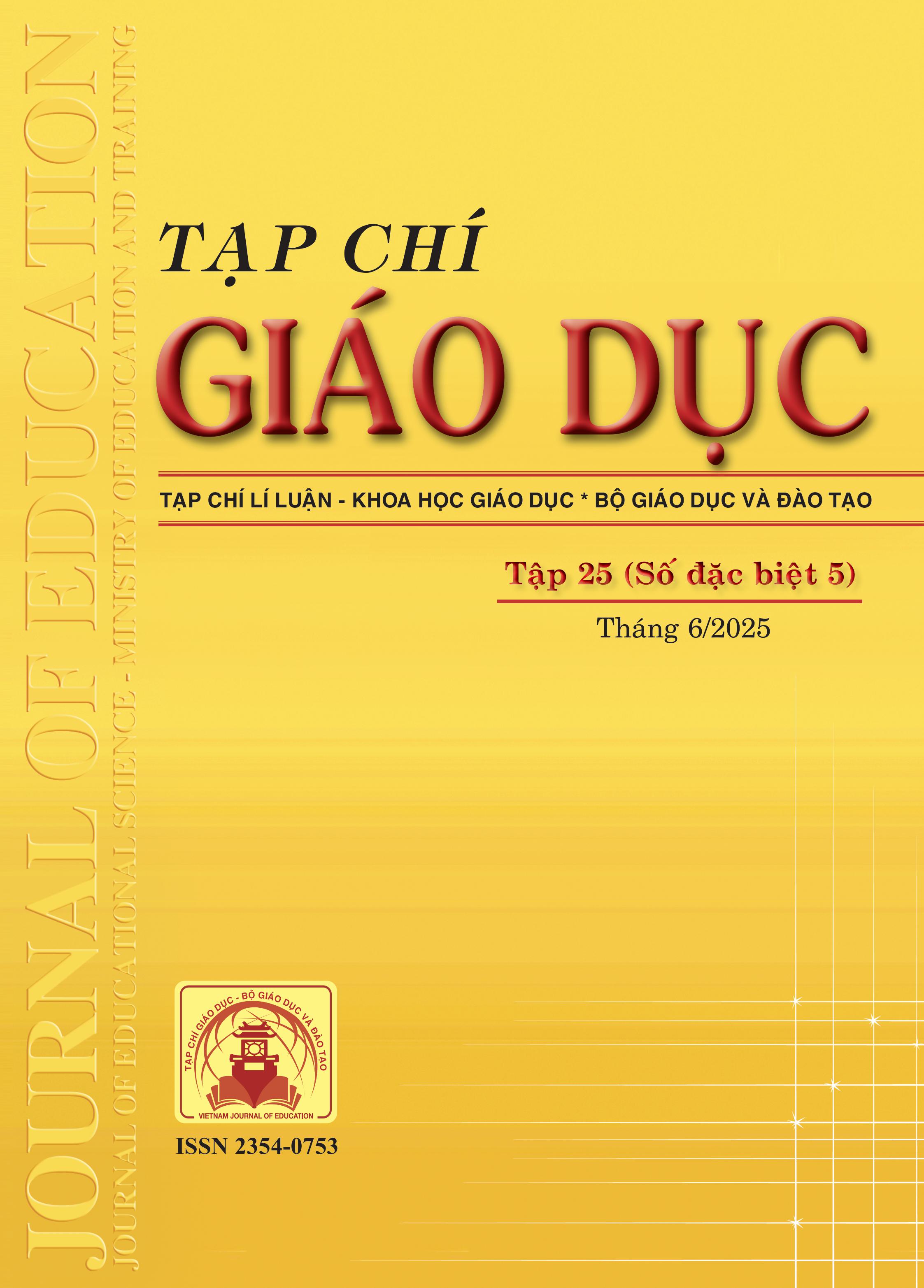Tác động của yếu tố quản lí đến kết quả xây dựng trường học hạnh phúc: Một nghiên cứu về các trường tiểu học tại Thành phố Hồ Chí Minh
Tóm tắt
In the context of modern education, building happy schools has become an important goal aimed at enhancing the overall quality of education for students. This study seeks to explore how various management factors influence the effectiveness and sustainability of implementing the happy school model in primary schools located in District 1, Ho Chi Minh City. The research employs a mixed-methods approach, combining both qualitative and quantitative methods, with a survey sample of 219 school administrators and teachers. The analysis results indicate that the factors of planning, organizing, directing, inspecting, and the outcome of building happy schools are positively correlated at a high level. Among them, the planning factor has a statistically significant and positive impact on the outcome of building happy schools (β = 0.520; p < 0.001). Based on the findings, the study proposes several measures to enhance the effectiveness of school management in the process of building happy schools at the primary level, and also provides suggestions for further in-depth research in future studies.
Tài liệu tham khảo
Calp, Ş. (2020). Peaceful and happy schools: How to build positive learning environments. International Electronic Journal of Elementary Education, 12(4), 311-320. https://iejee.com/index.php/IEJEE/article/view/1073
Döş, İ. (2013). Mutlu okul [Happy school]. Eğitim ve Bilim, 38(170), 266-280. https://eb.ted.org.tr/index.php/ EB/article/download/2029/560
Du, N. T., Dang, T. V., & Le, L. T. T. (2025). Applying CIPO indicators to examine the implementation of a happy school model in Vietnam. International Journal of Innovative Research and Scientific Studies, 8(2), 1903-1914. https://ijirss.com/index.php/ijirss/article/view/5582/988
George, D., & Mallery, P. (2003). SPSS for Windows step by step: A simple guide and reference (4th ed.). Allyn & Bacon.
Gramaxo, P., Flores, I., Dutschke, G., & Seabra, F. (2023). What makes a school a happy school? Parents' perspectives. Education Sciences, 13(4), 375. https://repositorioaberto.uab.pt/entities/publication/3f1e826d-fe17-4ab3-973c-ee03194a4cff
Hallinger, P., & Heck, R. H. (2010). Collaborative leadership and school improvement: Understanding the impact on school capacity and student learning. School Leadership & Management, 30(2), 95-110. https://doi.org/10.1080/13632431003663214
Hà Vĩnh Thọ (2023). Happy school: mỗi ngày đến trường là một niềm vui (in lần 2). Hà Nội: NXB Lao động.
Huỳnh Văn Sơn, Hồ Ngọc Kiều (2023). Thực trạng cán bộ quản lí, giáo viên và học sinh thực hiện nhiệm vụ xây dựng trường học hạnh phúc tại các trường trung học phổ thông tỉnh Long An. Tạp chí Khoa học, Trường Đại học Sư phạm Thành phố Hồ Chí Minh, 20(6), 1093-1105.
Nguyễn Hồng Thuận (2022). Xây dựng văn hoá học đường: một cách tiếp cận từ yếu tố kỉ luật tích cực và cảm nhận hạnh phúc. Tạp chí Giáo dục, 22(6), 26-30.
Nguyễn Lệ Thùy. (2024). Quản lí xây dựng trường học hạnh phúc tại các trường tiểu học thành phố Lạng Sơn, tỉnh Lạng Sơn. Tạp chí Thiết bị Giáo dục: Quản lí giáo dục, 1(310), 396-398.
Nguyen, N. P., Le, V. T., Nguyen, H. G., & Nguyen, T. T. H. (2022). Teachers’ awareness of happy schools with UNESCO items: a case study of a primary school in Hanoi, Vietnam. The VMOST Journal of Social Sciences and Humanities, 64(2), 38-47.
Nguyen, N. P., Le, V. T., Nguyen, H. G., Thu, H. T. A., & Nguyen, N. H. (2024). Exploring the integration of the Happy School Model in Vietnamese higher education: Insights and implications from the perspectives of tertiary EFL teachers. International Journal of Educational Methodology, 10(1), 879-892. https://www.ijem.com/exploring-the-integration-of-the-happy-school-model-in-vietnamese-higher-education-insights-and-implications-from-the-perspectives-of-tertiary-efl-teachers
Nguyễn Văn Cao, Trần Lương (2024). Quản lí hoạt động xây dựng trường học hạnh phúc ở các trường tiểu học, quận Ninh Kiều, Thành phố Cần Thơ. Tạp chí Thiết bị Giáo dục: Nghiên cứu ứng dụng, 1(318), 396-398.
Nguyễn Văn Thanh (2024). Lãnh đạo trường học hạnh phúc. Hà Nội: NXB Công Thương.
Phạm Minh Giản, Đặng Quốc Bảo, Tăng Thái Thụy Ngân Tâm, Phạm Văn Tặc (2021). Happy schools: Perspectives and matters of organization-pedagogy in school's building and development. International Education Studies, 14(6), 92-102.
Phạm Thị Phương Thức, Bùi Thị Nga (2020). Giải pháp xây dựng trường học hạnh phúc, giảm áp lực học tập cho học sinh tại khối Trung học phổ thông Nguyễn Bỉnh Khiêm - Hà Nội. Tạp chí Khoa học Giáo dục Việt Nam, 34, 54-59. http://lib.yhn.edu.vn/bitstream/YHN/23307/1/N434.pdf
Phòng Giáo dục và Đào tạo Quận 1 (2025). Báo cáo số 57/BC-GDĐT ngày 14/01/2025 sơ kết công tác giáo dục tiểu học Học kì I năm học 2024-2025.
Thủ tướng Chính phủ (2024). Quyết định số 1705/QĐ-TTg ngày 31/12/2024 phê duyệt Chiến lược phát triển giáo dục đến năm 2030, tầm nhìn đến năm 2045.
UNESCO (2016). Happy schools: A framework for learner well-being in the Asia-Pacific. United Nations Educational, Scientific and Cultural Organization. https://unesdoc.unesco.org/ark:/48223/pf0000246124
UNESCO (2024). Why the world needs happy schools: Global report on happiness in and for learning. Paris: United Nations Educational, Scientific and Cultural Organization. https://doi.org/10.54675/NPEQ5495
Đã Xuất bản
Cách trích dẫn
Số
Chuyên mục
Giấy phép

Tác phẩm này được cấp phép theo Ghi nhận tác giả của Creative Commons Giấy phép quốc tế 4.0 .












